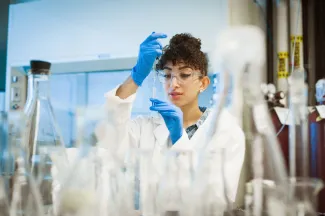“Problems in engineering are rarely well-defined, and it’s easy to be overwhelmed, particularly if the problem is abstract. Good problem-solving skills are essential to being successful, and it’s important to keep training those skills.”

Edward Wang
- Degree:
- Bachelor of Applied Science
- Grad year: 2019
- Program:
- Campus: Vancouver
When I came to UBC Engineering in 2014, I knew little about what engineering is and what engineers do. In the five years since, I’ve had many opportunities to learn about the discipline, and I am very happy with my choice. Some highlights of my time at UBC include: joining the UBC BIOMOD design team and competing internationally; developing a surgical planning software during my co-op terms; and writing an independent undergraduate thesis on using machine learning to develop a model for hemicellulose decomposition and presenting it at a student conference. Along the way I’ve made lifelong friends, the presence of whom have made my degree so much more enjoyable. I’ve learned and practiced math and science, and just as importantly, the ability to problem solve. Though I am a little sad to be leaving UBC, I am excited to use the skills I learned here to tackle problems of the future.
What has made your time at UBC the most memorable?
The people, definitely. I’ve made some of my closest friends through BIOMOD, where we spent many late nights in the lab to finish our projects. I found that the standard time tables were also conducive to forming strong friendships, as we all had common deadlines and exams. I’d also like to mention my professors and the other faculty that I’ve had the pleasure of interacting with, who are so supportive of their students.
What have you learned in engineering that is most valuable?
Problem solving is by far the most important skill that I’ve learned in engineering. I think that ability to take a macroscopic view of the complex problem, reducing it down into manageable subproblems, and then solving those subproblems individually is useful in all facets of life. Problems in engineering are rarely well-defined, and it’s easy to be overwhelmed, particularly if the problem is abstract. Good problem-solving skills are essential to being successful, and it’s important to keep training those skills.
What has been your most valuable non-academic experience studying engineering at UBC
My co-op work terms. In total, I worked for 16 months at Vancouver General Hospital (VGH) to develop a software platform for virtually planning jaw surgery. Put simply, the software uses medical imaging data to create a reconstruction plan and models of the necessary surgical guides to carry it out. The surgical guides are 3D printed and used intraoperatively. Over my time there, I developed the software and set up a pipeline for using the guides in surgery. We recently finished collecting results for our clinical trial and are currently analyzing results.
My time on the UBC BIOMOD team is a close second for favourite experience at UBC. I enjoyed putting in the work with my teammates, and seeing it pay off at the annual competition.
What advice would you give a student considering engineering?
Firstly, I recommend working on technical projects, especially in a team environment (design teams are perfect). Projects are a fun way to improve your knowledge base and skillset, and at the end you have something to showcase your abilities, and it’ll be something you enjoy talking about. Secondly, talk to your professors! You never know what opportunities may come out of it, and even if nothing does, they are knowledgeable people worth getting to know. Lastly, join the co-op program — the co-op job board is a convenient collection of job postings, and some employers only post on the board.
Where do you find your inspiration?
My inspiration comes from people. I really enjoy discussing science and technology, and every conversation is an opportunity for an idea. Talking to others has the added benefit of challenging me to see if I actually understand what I’m talking about, which often isn’t the case. I also like to think in the shower, but since I’m a slow thinker it is a less sustainable and much more expensive option.
What are your plans for the future?
After graduation, I am returning to work at VGH to continue the surgical planning project. When I return the project team will be bigger and have more interdisciplinary collaboration, which I am incredibly excited for. Long-term, I want to pursue a career in medicine or biomedical engineering, and work on technology that could one day be used in self-contained medical machines, which are currently in the realm of science fiction.



